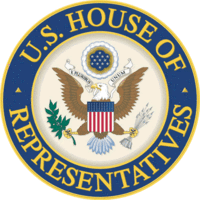 Earlier today, the House Committee on the Judiciary held a hearing to discuss the Innovation Act (H.R. 3309), a bill that was introduced last week by the Chairman of the Committee, Rep. Bob Goodlatte (R-VA). The Committee invited four witnesses to provide testimony on the issues addressed by the Bill: Mr. Krish Gupta, Senior Vice President and Deputy General Counsel of EMC Corporation; Mr. Kevin Kramer, Vice President and Deputy General Counsel for Intellectual Property of Yahoo! Inc.; Mr. David J. Kappos, former Under Secretary of Commerce for Intellectual Property and Director of the U.S. Patent and Trademark Office; and Mr. Robert A. Armitage, former General Counsel of Eli Lilly & Co. In addition, statements were provided by the chairs and ranking members of the House Committee on the Judiciary and the Subcommittee on Courts, Intellectual Property, and the Internet -- Rep. Goodlatte, Rep. John Conyers, Jr. (D-MI), Rep. Howard Coble (R-NC), and Rep. Mel Watt (D-NC).
Earlier today, the House Committee on the Judiciary held a hearing to discuss the Innovation Act (H.R. 3309), a bill that was introduced last week by the Chairman of the Committee, Rep. Bob Goodlatte (R-VA). The Committee invited four witnesses to provide testimony on the issues addressed by the Bill: Mr. Krish Gupta, Senior Vice President and Deputy General Counsel of EMC Corporation; Mr. Kevin Kramer, Vice President and Deputy General Counsel for Intellectual Property of Yahoo! Inc.; Mr. David J. Kappos, former Under Secretary of Commerce for Intellectual Property and Director of the U.S. Patent and Trademark Office; and Mr. Robert A. Armitage, former General Counsel of Eli Lilly & Co. In addition, statements were provided by the chairs and ranking members of the House Committee on the Judiciary and the Subcommittee on Courts, Intellectual Property, and the Internet -- Rep. Goodlatte, Rep. John Conyers, Jr. (D-MI), Rep. Howard Coble (R-NC), and Rep. Mel Watt (D-NC).
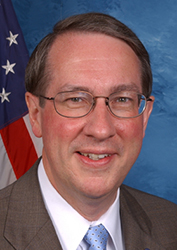 Rep. Goodlatte (at left) opened the proceedings by suggesting that abusive litigation practices have already damaged our patent system. The tenor of his statement was that patent trolls are destroying our patent system, and that abusive patent litigation is a drag on our economy. His use of the pejorative term "patent troll" was telling, especially without providing a workable definition. Rep. Goodlatte pointed out that the recently enacted America Invents Act was prospective in nature, but that the newly introduced legislation was currently needed to combat problems that are more immediate, and that go to the heart of abusive litigation practices. The current bill was portrayed as being the product of years of work, which included collaborations with others and the release of two "discussion" drafts earlier this year. The problem, as Rep. Goodlatte put it, is that these patent trolls are just looking for a quick payday, requesting settlements for amounts just under what it would cost to litigate. He noted that "something is terribly wrong here" after listing a series of anecdotal examples of such abusive practices, without providing any details of these examples, much less what made them "abusive." The only detail that he provided was for the company Lodsys (although not identified by name), explaining its campaign to obtain licenses for a patent which it alleges covers all in-app purchases. However, Rep. Goodlatte noted that one of the recipients of such a letter, Martha Stewart, decided to fight back, filing a declaratory judgment action against Lodsys. Interestingly, the new heightened pleading standard in the Innovation Act would not apply to Ms. Stewart in this case, and therefore, if this bill passes, any declaratory judgment plaintiff will still need only allege invalidity with no more specificity than the patent is invalid "under at least one of 35 U.S.C. §§ 101, 102, 103, and 112." Rep. Goodlatte did stress that any legislation needs to target behavior, and not specific entities. In addition, he also stressed Congress' authority to pass laws that impact the judiciary, which was likely in response to criticism that has been leveled against Congress overstepping its bounds by attempting to dictate new requirements for court rules and procedures. After all, Rep. Goodlatte stated, heightened pleading standards just make common sense.
Rep. Goodlatte (at left) opened the proceedings by suggesting that abusive litigation practices have already damaged our patent system. The tenor of his statement was that patent trolls are destroying our patent system, and that abusive patent litigation is a drag on our economy. His use of the pejorative term "patent troll" was telling, especially without providing a workable definition. Rep. Goodlatte pointed out that the recently enacted America Invents Act was prospective in nature, but that the newly introduced legislation was currently needed to combat problems that are more immediate, and that go to the heart of abusive litigation practices. The current bill was portrayed as being the product of years of work, which included collaborations with others and the release of two "discussion" drafts earlier this year. The problem, as Rep. Goodlatte put it, is that these patent trolls are just looking for a quick payday, requesting settlements for amounts just under what it would cost to litigate. He noted that "something is terribly wrong here" after listing a series of anecdotal examples of such abusive practices, without providing any details of these examples, much less what made them "abusive." The only detail that he provided was for the company Lodsys (although not identified by name), explaining its campaign to obtain licenses for a patent which it alleges covers all in-app purchases. However, Rep. Goodlatte noted that one of the recipients of such a letter, Martha Stewart, decided to fight back, filing a declaratory judgment action against Lodsys. Interestingly, the new heightened pleading standard in the Innovation Act would not apply to Ms. Stewart in this case, and therefore, if this bill passes, any declaratory judgment plaintiff will still need only allege invalidity with no more specificity than the patent is invalid "under at least one of 35 U.S.C. §§ 101, 102, 103, and 112." Rep. Goodlatte did stress that any legislation needs to target behavior, and not specific entities. In addition, he also stressed Congress' authority to pass laws that impact the judiciary, which was likely in response to criticism that has been leveled against Congress overstepping its bounds by attempting to dictate new requirements for court rules and procedures. After all, Rep. Goodlatte stated, heightened pleading standards just make common sense.
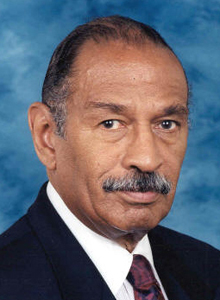 Before Rep. Conyers (at right) gave his statement, Rep. Goodlatte pointed out that in September, Rep. Conyers surpassed Sam Rayburn as the eighth-longest serving member of the House of Representatives in U.S. history. Rep. Conyers then began by pointing out that our patent system is the envy of the world. In order to maintain this position, he recently introduced the "Innovation Protection Act of 2013" with Rep. Watt, Rep. Darrell Issa, and Rep. Doug Collins, to prevent the diversion of USPTO fees. He noted that poor quality patents are a concern, and that we must give the Office the resources that it needs to improve the system. With regard to the Innovation Act, Rep. Conyers noted the various concerns that some non-practicing entities were causing, but he also urged caution in addressing these concerns. "Our first rule should be that we do no harm to our patent system," warning that we should not do anything to discourage innovation or increase the litigation that Congress is attempting to prevent. He stated that Congress should not be considering amending the fee shifting statute at this time, because the Supreme Court is taking up the issue this term. He also urged that Congress should not rush to expand the use of business method patents review as provided for in the recently enacted AIA. Rep. Conyers continued by reminding that Congress has asked the Courts to develop their own rules for the past 80 years, and that he saw no reason to abrogate that power at this time. He also did not see a need to create a special carve-out for the pharmaceutical industry (although, to be fair, the exceptions for Hatch-Waxman litigation were likely necessitated by the time constraints associated with such cases–complaints that need to be filed within 45 days of notice of infringement, and completion of litigation within 30 months). He concluded by urging the Chair to move cautiously, carefully, and deliberately.
Before Rep. Conyers (at right) gave his statement, Rep. Goodlatte pointed out that in September, Rep. Conyers surpassed Sam Rayburn as the eighth-longest serving member of the House of Representatives in U.S. history. Rep. Conyers then began by pointing out that our patent system is the envy of the world. In order to maintain this position, he recently introduced the "Innovation Protection Act of 2013" with Rep. Watt, Rep. Darrell Issa, and Rep. Doug Collins, to prevent the diversion of USPTO fees. He noted that poor quality patents are a concern, and that we must give the Office the resources that it needs to improve the system. With regard to the Innovation Act, Rep. Conyers noted the various concerns that some non-practicing entities were causing, but he also urged caution in addressing these concerns. "Our first rule should be that we do no harm to our patent system," warning that we should not do anything to discourage innovation or increase the litigation that Congress is attempting to prevent. He stated that Congress should not be considering amending the fee shifting statute at this time, because the Supreme Court is taking up the issue this term. He also urged that Congress should not rush to expand the use of business method patents review as provided for in the recently enacted AIA. Rep. Conyers continued by reminding that Congress has asked the Courts to develop their own rules for the past 80 years, and that he saw no reason to abrogate that power at this time. He also did not see a need to create a special carve-out for the pharmaceutical industry (although, to be fair, the exceptions for Hatch-Waxman litigation were likely necessitated by the time constraints associated with such cases–complaints that need to be filed within 45 days of notice of infringement, and completion of litigation within 30 months). He concluded by urging the Chair to move cautiously, carefully, and deliberately.
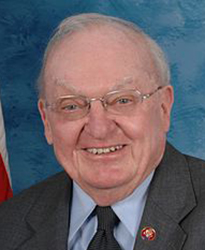 Rep. Coble (at left), the Chair of the Subcommittee on Courts, Intellectual Property and the Internet began his statement by pointing out that the actions of so-called patent trolls amount to nothing more than litigation extortion. However, even though the bill is attempting to address some of the most abusive litigation practices, he pointed out that these reforms will apply to all patents. Therefore, he cautioned that the House needs to work collaboratively with the Administration and the Senate in order to obtain meaningful reform. American innovation cannot be held hostage to frivolous litigation, he concluded.
Rep. Coble (at left), the Chair of the Subcommittee on Courts, Intellectual Property and the Internet began his statement by pointing out that the actions of so-called patent trolls amount to nothing more than litigation extortion. However, even though the bill is attempting to address some of the most abusive litigation practices, he pointed out that these reforms will apply to all patents. Therefore, he cautioned that the House needs to work collaboratively with the Administration and the Senate in order to obtain meaningful reform. American innovation cannot be held hostage to frivolous litigation, he concluded.
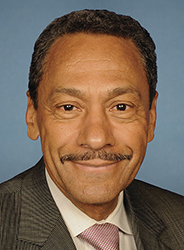 Finally, Rep. Watt (at right), ranking member of the same subcommittee, gave his statement. He started by observing that the problem with so-call patent trolls is not as enormous as portrayed, or as urgent. As support, he cited the recent GAO report, which had the take-away message that it was the operating companies that were fighting amongst themselves (see "The GAO Issues a Report on Patent Litigation Trends -- It Turns Out that the Sky Is Not Falling"). However, even though NPEs only brought a faction of the litigation, they engage in litigation tactics that pose unique challenges, which will require unique solutions. Rep. Watt expressed concern that the proposed solutions might have adverse effects on all patent litigants, and therefore care must be taken to examine not only how the provisions will impact the bad actors, but how they will impact all participants. He expressed dismay at the fact that even though the Chair had released two discussion drafts prior to introducing the bill, the process for developing and testing the proposed litigation proposals had been "insular and disappointing." Rep. Watt supported some of the concepts, but worried about the interactions and execution of some provisions, and questioned the wisdom of others. He continued: "In the meantime, we risk jeopardizing comity with the federal judiciary with overly proscriptive mandates, losing the trust and confidence of the small and independent innovators with unbalanced remedies that leave them out of the equation, and even worse, we run the risk of enacting measures that could not only be ineffective, but could exacerbate the current problem or invite new unintended problems." He concluded by noting that multiple, credible, and thoughtful stakeholders have expressed grave reservations about one provision or another in the Chair's bill, and that these concerns should not be dismissed as "opposition or obstructionism," but instead open reflection and engagement is needed.
Finally, Rep. Watt (at right), ranking member of the same subcommittee, gave his statement. He started by observing that the problem with so-call patent trolls is not as enormous as portrayed, or as urgent. As support, he cited the recent GAO report, which had the take-away message that it was the operating companies that were fighting amongst themselves (see "The GAO Issues a Report on Patent Litigation Trends -- It Turns Out that the Sky Is Not Falling"). However, even though NPEs only brought a faction of the litigation, they engage in litigation tactics that pose unique challenges, which will require unique solutions. Rep. Watt expressed concern that the proposed solutions might have adverse effects on all patent litigants, and therefore care must be taken to examine not only how the provisions will impact the bad actors, but how they will impact all participants. He expressed dismay at the fact that even though the Chair had released two discussion drafts prior to introducing the bill, the process for developing and testing the proposed litigation proposals had been "insular and disappointing." Rep. Watt supported some of the concepts, but worried about the interactions and execution of some provisions, and questioned the wisdom of others. He continued: "In the meantime, we risk jeopardizing comity with the federal judiciary with overly proscriptive mandates, losing the trust and confidence of the small and independent innovators with unbalanced remedies that leave them out of the equation, and even worse, we run the risk of enacting measures that could not only be ineffective, but could exacerbate the current problem or invite new unintended problems." He concluded by noting that multiple, credible, and thoughtful stakeholders have expressed grave reservations about one provision or another in the Chair's bill, and that these concerns should not be dismissed as "opposition or obstructionism," but instead open reflection and engagement is needed.
As we have noted in the past, it is likely that some form of legislation will likely pass in the near future to address the perceived "abusive patent litigation" problem. However, we have expressed our own "grave reservations" regarding some of the provisions of the Innovation act. As such, we appreciated the statements of Reps. Conyers and Watt, and hope that the House fully scrutinizes each of these provisions to ensure that they are narrowly tailored to address the perceived problems. We also hope that the House considers any and all consequences of each provision in order to hopefully avoid any that are unintended.